Coming on the heels of weeks of unrest in Chile, this week’s coup in Bolivia has obvious geopolitical ramifications, as well as echoes of that country’s infamous ‘Cocaine Coup’ in 1980.
While researching “Barry & ‘the boys,” I spent time with a man who had been U.S. pro-consul in Bolivia in the 1980’s, and a close associate of Barry Seal.
In the book he was identified with a pseudonym, ‘Gus’. Since deceased, I can now use his name: Russ Eakin.
Our NSA source “Gus” was a steely-eyed man dressed, when we first met him, in a tight-fitting olive drab t-shirt. He entered the restaurant where we were to rendezvous, Dan B’s in Bay St. Louis on the Mississippi Gulf Coast, unnoticed…
“I was asked if I was interested in taking a trip to Honduras in the summer of 1964,” he began, sliding into a chair and anticipating our first question.
“I was so eager that I learned Spanish in just two weeks… I ended up spending the next two decades of my life living in Central and South America, eventually working for two different competing factions of the US Government: Customs and the NSA.”
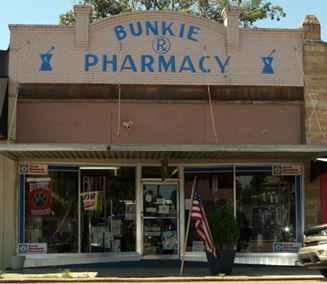 Gus was from the tiny town of Bunkie, Louisiana, he told us, where his thirst for adventure had been nurtured by an accomplished mother who was a writer and Ph.D. (His mother, an historian, was behind the book that became the movie “12 Years a Slave.”
Gus was from the tiny town of Bunkie, Louisiana, he told us, where his thirst for adventure had been nurtured by an accomplished mother who was a writer and Ph.D. (His mother, an historian, was behind the book that became the movie “12 Years a Slave.”
“What did you do in South America?” I asked.
When job descriptions were more candid
“My job was to corrupt the governments of Central and South America,” he replied crisply. “I was so good at it that I didn’t come back to the States for 17 years.”
 “I first met Barry Seal in the lobby of the Hotel Maya in Tegucigalpa, Honduras, back in the mid-70’s,” he continued. “Barry was good friends with the owners of the hotel, the center of intrigue in Central America back then. And just by looking at each other, we both knew what the other was doing, although neither of us stated it openly to the other when we met, or for a long time afterwards. It was just… understood.”
“I first met Barry Seal in the lobby of the Hotel Maya in Tegucigalpa, Honduras, back in the mid-70’s,” he continued. “Barry was good friends with the owners of the hotel, the center of intrigue in Central America back then. And just by looking at each other, we both knew what the other was doing, although neither of us stated it openly to the other when we met, or for a long time afterwards. It was just… understood.”
“Besides, what we were doing wasn’t as important as the fun we were having doing it. We were—both of us—making more money than we knew what to do with, and having a great old time doing it.”
“Barry Seal was one of the smartest people I ever met,” Gus told us. “He was a remarkable entrepreneur. We became good friends. He was one of the few people I ever felt I could trust. And, while I was in Bolivia in the mid-‘80’s, he was one of my closest associates.”
 We showed him the picture of Seal from Mexico City in 1963. “That picture was taken in the night club in the Aristos Hotel, on Heidelberg street off Avenida Reforma in the Zona Rosa,” he responded immediately. “I know it well. It’s called the Angus restaurant.”
We showed him the picture of Seal from Mexico City in 1963. “That picture was taken in the night club in the Aristos Hotel, on Heidelberg street off Avenida Reforma in the Zona Rosa,” he responded immediately. “I know it well. It’s called the Angus restaurant.”
“When did you and Barry…?” He stopped our question with a wave of his hand.
“What have you learned about Operation Condor?” he demanded.
Three days of the condor
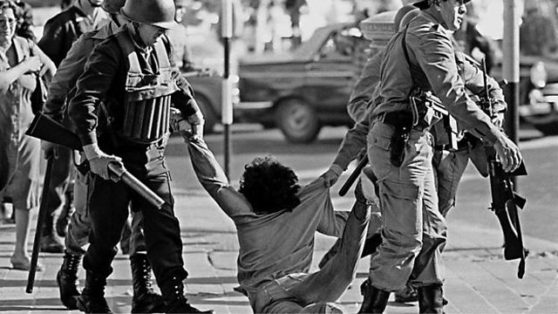 I began with what is, nakedly and undoubtedly, Operation Condor’s most spectacular event…
I began with what is, nakedly and undoubtedly, Operation Condor’s most spectacular event…
Just after dawn on July 17, 1980, paramilitary squads in combat fatigues and black ski masks—featureless except for swastika armbands—roared through the downtown streets of the capital city of La Paz, Bolivia, firing on anything that moved. They were soon joined in mutiny by marauding bands of Bolivian soldiers.
The “Cocaine Coup” had begun.
While long-suffering Bolivia had suffered a hundred fifty coups before, this one became the worst torture and killing spree in Bolivian history.
When it became public in the mid-’90’s, President Clinton came close to apologizing. And it had all been engineered through Operation Condor.
A month before, six of Bolivia’s biggest drug traffickers met with military conspirators to hammer out a financial deal for future protection of the cocaine trade.
According to Peter Dale Scott in Cocaine Politics, a La Paz businessman said the coming putsch should be called the “Cocaine Coup.” He was right. And today it is…
An Argentine secret policeman told DEA agent Michael Levine the CIA knew all about the coup. “You North Americans amaze me. Don’t you speak to your own people?” the officer wondered.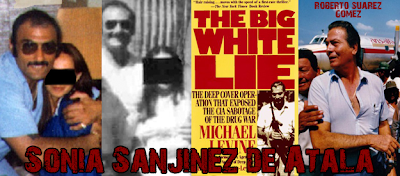
It’s still a difficult question
“Do you think Bolivia’s government—or any government in South America—can be changed without your government and mine being aware of it?”
When Levine asked why that affected the planned DEA investigation, the Argentine answered, “Because the same people being named as drug dealers are the people who we are helping to rid Bolivia of leftists.”
Three weeks later, Levine met with a Bolivian drug trafficker who outlined plans for the new government in which his niece, Sonia Atala, a major cocaine supplier, would “be in a very strong position.”
(Barry Seal worked with Sonia Atala.)
The masked paramilitary thugs in the coup turned out not to even be Bolivians, but spoke French, Italian and German, and Spanish with Argentine accents.
Their presence in Bolivia would later be ascribed to the CIA—and Operation Condor.
General Luis Garcia Meza was in control. His first act was to release drug traffickers from jail and destroy police records of trafficking. He had brought in the neo-fascist paramilitary squads wearing swastika armbands, calling themselves the “Fiancés of death.”
Garza immediately put the Interior Ministry under the control of the nephew of Roberto Suarez, the Bolivian kingpin who went on to become exactly what he styled himself as… the King of Cocaine.
Married into the Family
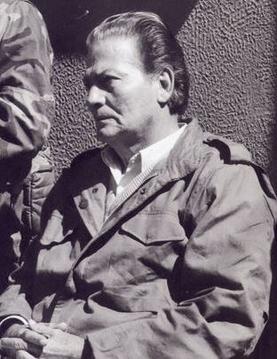 “I knew Roberto Suarez very well,” Gus said quietly, interrupting our narrative. “I was married to one of the Suarez’s.”
“I knew Roberto Suarez very well,” Gus said quietly, interrupting our narrative. “I was married to one of the Suarez’s.”
Who had financed the cocaine coup, with $50 million? It’s the same man who the year before had financed the successful coup in Honduras…
The CIA’s “great good friend” Juan Matta Ballesteros.
Ballesteros was a man who gave the term ‘asset’ a whole new meaning.
 The Bolivian General Luis Garcia Meza, and his Interior Minister Arce, described as “a potbellied gangster in a metal-laden uniform,”were in business with Roberto Suarez, Bolivia’s biggest cocaine trafficker.
The Bolivian General Luis Garcia Meza, and his Interior Minister Arce, described as “a potbellied gangster in a metal-laden uniform,”were in business with Roberto Suarez, Bolivia’s biggest cocaine trafficker.
DEA agent Mike Levine in The Big White Lie recounts how local counterparts informed him that a coup was imminent in Bolivia, and that Argentina and the United States, both worried about Bolivia’s “leftist” government, were encouraging the plotters.
“Levine was in way over his head…”Gus told us. “He himself was part of Operation Condor, though he doesn’t admit it.”
“We worked with him.”
 Nazi war criminal Klaus Barbie had organized the Condor paramilitary groups. Barbie, known in France as the “Butcher of Lyon,” lived in Bolivia for years under the alias of Klaus Altmann.
Nazi war criminal Klaus Barbie had organized the Condor paramilitary groups. Barbie, known in France as the “Butcher of Lyon,” lived in Bolivia for years under the alias of Klaus Altmann.
“I knew Klaus Barbie,” Gus stated calmly. “We—American intelligence—worked with him. We had to: he virtually owned the damn country. Klaus Barbie controlled the Bolivian military, so we had to do business with him.
“I remember asking him at lunch one day…did he ever have any regrets about WWII? He said, ‘just that I never finished killing the bastards.’”
When an outspoken Bolivian socialist, Marcelo Quiroga, called for a national strike to protest the Bolivian coup, military agents dressed in civilian clothes arrived at his La Paz union headquarters in ambulances and stormed the meeting, reportedly killing him.
He was shot, but did not die instantly; kept alive for hours by Argentinean ‘torture experts’ adept at keeping a person living for the longest time possible while inflicting maximum pain.
Day later, his castrated and tortured body was found outside La Paz. His wife, Christina Quiroga, was at home when a friend called; saying everyone at the meeting had been taken prisoner.
All that was left in her husband’s office was blood. “They shot Marcelo, but he didn’t die,” Quiroga Santa Cruz said thirteen years later on a visit to Chicago, in which she showed reporters a copy of a newspaper article featuring a picture of her husband’s beaten face.
Enraged, she enlisted the families of others killed in the “cocaine coup” of 1980 and went to court. The man they went after was Army Commander Luis Garcia Meza, leader of the junta that seized power that day, and notorious for his involvement in drug trafficking.
A “dangerous ideology”
“The significance of the coup went beyond the borders of Bolivia. The impoverished nation had just become the latest battleground in a war.
Bolivia’s neighbors to the south were ruled by authoritarian rightwing regimes. But to the north, the rest of Spanish-speaking South America was governed by democratic civilian regimes.
“The Argentines’ and the Chileans’ saw the dangerous ideology of democracy arriving at their borders, and they didn’t like it,” said one Andean Pact diplomat. Nor, apparently, did US proconsuls.
“Forget politics,” said one Bolivian businessman. “For people here, the question was: who is going to control the cocaine trade?”
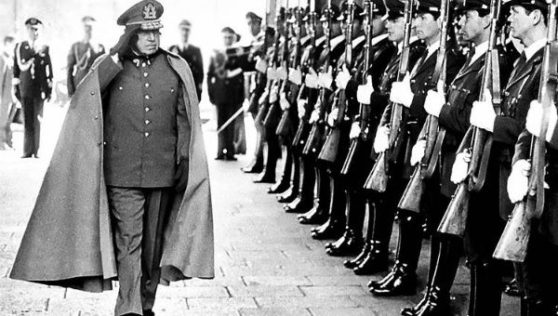 For the United States the cocaine coup was a diplomatic triumph, the result of the coordinated intelligence efforts of Operation Condor…
For the United States the cocaine coup was a diplomatic triumph, the result of the coordinated intelligence efforts of Operation Condor…
That it ALSO ushered in Bolivia’s most repressive regime in the 20th century, well, that may well have been precisely the point…
“Operation Condor was the result of years of careful planning designed to take over an entire hemisphere,” Gus explained. “It was the conquest and then plundering of an entire, nearly virgin, continent, for the benefit of the American intelligence operatives involved in the operation.”
POSTSCRIPT: At one point, I ran afoul of Russ, by trying to show him that I’d been doing my homework. By that point in my investigation I’d lost interest in romantic tales of drug pilot daring do while skimming ten feet over the surging waves of the Gulf of Mexico on a ‘dangerous’ drug run. I was now more interested in tracing the money back up the line.
Over drinks, I tried to make my voice as casual as possible. “So, ah, Russ, what can you tell me about Bernardo Dominguez?”
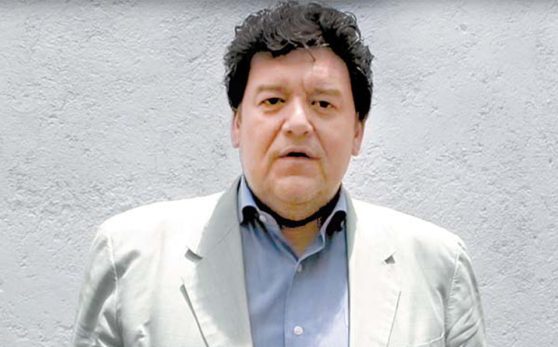 I was unprepared for the vehemence of his response. There was instant silence. Then a glare. “How do you know about Bernardo Dominguez?” he demanded.
I was unprepared for the vehemence of his response. There was instant silence. Then a glare. “How do you know about Bernardo Dominguez?” he demanded.
He didn’t bother to wait for a reply. “Listen,” he told me. “I agreed to talk to you about Barry Seal, who died 20 years ago. And now you’re asking about Bernardo Dominguez. I don’t know if I can talk to you anymore.”
“I was only asking a question,” I said lamely. “I don’t know what I did wrong.”
“Don’t you know what you’re doing? Just by asking? You’re threatening to compromise current operations. And that can get you in real trouble.”
And that was that.

